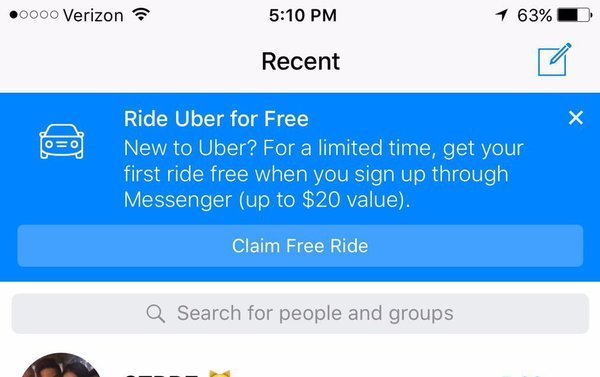Facebook Messenger is testing new ways to monetize advertising right in chat rooms.

In 2014, Facebook forced all users to install the Facebook Messenger application, disabling the ability to chat for a standard client. Users perceived this innovation negatively - the company actually forced to add a new messenger to the list of main applications. Otherwise, the terms of using Facebook Messenger remain the same except for the introduction of the possibility of using the messenger without registering with Facebook.
Now, on Facebook Messenger, an ad for third-party services has appeared - for the first time this was noticed by the TechCrunch staff. Now local businesses have the opportunity to announce promotions or provide additional information about any projects using advertising directly in the messenger.
')
At the moment, an ad has surfaced only for Uber and it is not yet known whether Facebook is going to open massive access to this type of advertising. Earlier in Facebook Messenger, it was possible to call Uber, but this kind of Uber promotion was unpopular among users. It is noteworthy that up to this point, none of the representatives of TechCrunch, who discovered a new type of display of the proposal to use Uber, did not notice. Accordingly, this is not a simple ad for active users of Uber via Facebook, but a separate ad. It is likely that a social network can offer this kind of promotion for other products.
Currently, users have an ambiguous attitude as a messenger to Facebook Messenger - in the App Store, the application has a rating of three stars and has not changed much in recent months. Against the backdrop of Facebook Messenger, instant messengers such as Telegram stand out. Their popularity is due to fast speed, low weight of the client, as well as user-friendly interface.
Compared to them, the prospects for monetization of Facebook Messenger are not yet clear - the messenger is gaining the bulk of the audience only due to the huge client base of the social network. It is likely that after the proposed integration of innovations from the social network absorbed by MSQRD, it will be possible to attract a new audience, but until this time Facebook Messenger is unlikely to become an independent product in demand compared to other instant messengers.
Source: https://habr.com/ru/post/299398/
All Articles